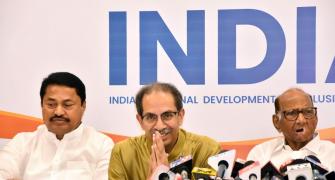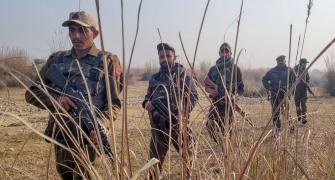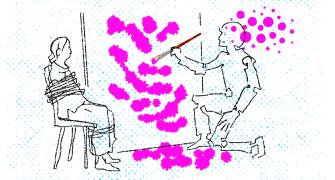Highlighting the terrorist incidents and communal riots during the previous National Democratic Alliance rule, Prime Minister Manmohan Singh on Saturday said his government will not allow communal and divisive forces to gain an upper hand.
Addressing the All India Congress Committee session in New Delhi, Dr Singh spoke about the achievements of his three-and-a-half year-old government in various sectors and expressed determination to push all-round development with an aim of ensuring benefits for all sections of the society.
He said special focus was being given to improvement of education, healthcare, rural development and infrastructure building besides uplift of minorities and backward classes.
Slamming the NDA government's 'India Shining' campaign as a 'flawed concept,' he asked: "Shining for whom? Shining for which region? Shining for which class of people?"
Dr Singh referred to the incidents of terror and communal riots during the BJP-led rule.
"Do think about the conditions prior to 2004. Communal tensions were at their peak throughout the country and attempts were being made to divide people on the basis of religion, caste, language," the prime minister said.
In his 50-minute speech, Dr Singh referred to the 2002 Gujarat riots, terror attacks on Parliament, Akshardham temple and Raghunath temple.
"As far as law and order situation (during the NDA rule) is concerned, terrorism was spreading across the country. The hands of terrorists could reach anywhere," he said.
The prime minister painted a dismal picture on economic front during the NDA rule, saying main sectors were neglected and particularly noted the debt situation of farmers and 'wave' of suicides by the agriculturists.
On the foreign policy during the BJP-led rule, the prime minister said: "Our relations with our neighbours were going through ups and downs. On the one hand, there were attempts to promote peace at Agra and Lahore and on the other, there was war in Kargil. All this was branded as India Shining."
"It was a mandate for reducing communal tensions and a mandate for removing divisive agendas."
Talking about the performance of his government, he said communal violence and incidents are 'far less' than before but acknowledged that 'some cities and towns have suffered' terror attacks in which many innocent citizens lost their lives.
"Our government will continue to fight terrorists at all levels and in all places and will be steadfast in its resolve," he asserted.
The prime minister also emphasised that till the time Congress was in power 'we will not allow communal and divisive forces to gain an upper hand in any part of the country and we will ensure that every individual can live in an environment of peace and security.'
Promising to make every section of the society active participant in the development process and ensure equal rights for all, the Prime Minister talked about initiatives for women, scheduled castes, scheduled tribes and minorities.
"The Congress party wants to increase the role of women in political life. We are committed to ensuring reservation for women in Parliament and in state assemblies and are continuing to make efforts to build a consensus," he said.
Dr Singh said his government had given special attention to the problems of scheduled castes and scheduled tribes and filled over 50,000 reserved posts through a special drive.
"We have given property rights to all those living in forests," he said.
On minorities, he said his government had appointed the Sachar Committee to find out the factual position about their conditions and the panel has established that the conditions are unsatisfactory and a lot needs to be done to improve them.
"We have started a massive scholarship programme for minorities," he said, adding that special emphasis was being given to 121 minority concentration districts with an objective of improving educational, health and banking facilities.
Besides marginalised groups, he said his government is laying equal emphasis on development of backward regions, for which a Backward Regions Grant Fund Scheme has been launched in 250 districts with an annual outlay of Rs 5,000 crore.
Special attention is also being paid to problems of Jammu and Kashmir and North Eastern states, he said, adding, "We are beginning to see positive results of our efforts."







